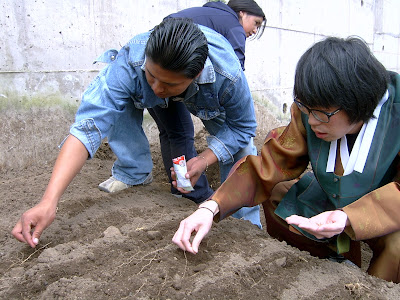What if every student worked in the garden?
Ever since the beginning stages of the project, talks about creating school gardens often came up. The idea was to teach students and parents how to grow their organic food for their own nutritional sustainability. Along the way, the thought developed into concrete plans with the Ecuadorian Ministry of Agriculture. We decided to start small. We made a small garden where students can familiarize themselves to the care of nature. The small produce the garden makes will be donated to the poorest of the neighborhood.
The townspeople gathered one day back in February 2011 to prepare the soil. With the help of a KOICA agriculture volunteer, we experimented with Korean seeds in the school garden. With great expectations we planted the seeds and waited for them to bud. Ecuador has plenty of rain and volcanic soil (which, apparently, is full of nutrients) so not much maintenance was needed.
Ever since the beginning stages of the project, talks about creating school gardens often came up. The idea was to teach students and parents how to grow their organic food for their own nutritional sustainability. Along the way, the thought developed into concrete plans with the Ecuadorian Ministry of Agriculture. We decided to start small. We made a small garden where students can familiarize themselves to the care of nature. The small produce the garden makes will be donated to the poorest of the neighborhood.
The townspeople gathered one day back in February 2011 to prepare the soil. With the help of a KOICA agriculture volunteer, we experimented with Korean seeds in the school garden. With great expectations we planted the seeds and waited for them to bud. Ecuador has plenty of rain and volcanic soil (which, apparently, is full of nutrients) so not much maintenance was needed.
 |
| <Alex, a teacher at the school, and Diego from KOICA planting seeds> |
Seeing that the first round of crops didn't yield good results, we quickly sought the help of Ecuadorian experts from the Ministry of Agriculture and changed the menu of seeds. The Ministry also offered to include our school in their "Action Nutrition" project and provided a greenhouse and an irrigation system for our garden. Taking advantage of the summer break, we managed to install everything in the school.
 |
| <Experts from the MInistry of Agriculture visit to our school> |
 |
| <Our garden gets an irrigation system installed> |
By September, we were starting a new semester. With the new semester, there was a change in Ecuadorian education law--now all bilingual schools (such as this one) were obligated to have a school garden. Happy with the accidental foresight our project had, the school principal grafted in a gardening class into their yearly curriculum. The seventh graders (seniors) were chosen to spend two hours a week out in the field learning from a specialist sent from the Ministry of Agriculture.
At first the students seemed a bit uninterested in the manual labor, but soon enough they began to show ownership of the field. We learned together the process of germination, weeding, and keeping the soil enriched with natural manure. The kindergarthen kids were also given seeds to plant in individual cups. With time, we found students checking on their plants every morning upon arrival.
At first the students seemed a bit uninterested in the manual labor, but soon enough they began to show ownership of the field. We learned together the process of germination, weeding, and keeping the soil enriched with natural manure. The kindergarthen kids were also given seeds to plant in individual cups. With time, we found students checking on their plants every morning upon arrival.
 |
| <Gardening class> |
 |
| <All the plants were arranged so that they would protect each other from parasites> |
At the success of our program, the Ministry of Agriculture and our team had mutual interest in further developing the gardening class curriculum so it could be applied to all bilingual schools. Maria Zara Pichazaca, the National Director of Bilingual Education, was happy to cooperate with this, and assigned representatives from eight different provinces to work with us in creating an intercultural gardening curriculum. The Ministry of Agriculture would further provide the funding to finance all teaching materials (as shown below) for 30 schools in each province.
 |
| <Demonstration of the "Gardening Fun" program> |
 |
| <Meeting with provincial leaders for the development of the new gardening curriculum> |
Vegetables are usually neglected in Ecuadorian tables. But, the students are learning how important it is for their bodies to eat a balanced diet. The indigenous worldview among the tribes of Ecuador also emphasize the importance of caring for the nature. Working with children in a country where the average farmer is over 50 years old, we are hoping and praying that the love of nature takes root in the hearts of the children.
※ Please post your comments on this posting
| Other posts of the project |
|---|
※ Please post your comments on this posting
0 comentarios:
Publicar un comentario